
Sonchus is a genus of flowering plants in the tribe Cichorieae within the family Asteraceae and are commonly known as sow thistles. Sowthistles are annual, biennial or perennial herbs, with or without rhizomes and a few are even woody.

Archips podana, the large fruit-tree tortrix, is a moth of the family Tortricidae. The species was first described by Giovanni Antonio Scopoli in his 1763 Entomologia Carniolica. It is found in Europe, Asia from Anatolia to Japan and is an introduced species in North America.

Spilonota ocellana, the bud moth, is a moth of the family Tortricidae. It is found in the Palearctic realm, from North Africa and Europe to Iran, eastern Russia, China, Korea, and Japan. It is also present on Madeira and in North America.
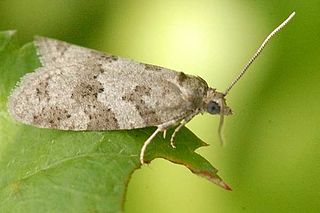
Cnephasia stephensiana, the grey tortrix, is a moth of the family Tortricidae. It is found in the Palearctic realm, and has also been recorded from Canada.
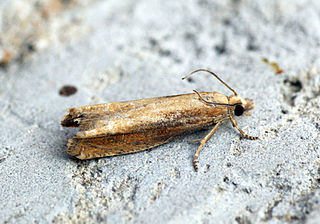
Eucosma obumbratana is a moth of the family Tortricidae. It is found in Europe, China (Jilin), Russia and Kazakhstan.

Philedone is a genus of moths belonging to the subfamily Tortricinae of the family Tortricidae. It contains only one species, Philedone gerningana, the cinquefoil tortrix or cinquefoil twist, which is found in Asia and Europe. It was first described by the Austrian lepidopterists Michael Denis and Ignaz Schiffermüller in 1775.

Blastesthia posticana is a moth of the family Tortricidae. It is found from northern and central Europe to eastern Russia.

Notocelia cynosbatella is a moth of the family Tortricidae. It is found from Europe to eastern Russia, it is also found in Asia Minor, Iran, Kazakhstan, China and Mongolia.

Clepsis senecionana, the rustic tortrix, is a moth of the family Tortricidae. It is found from Europe to eastern Siberia.
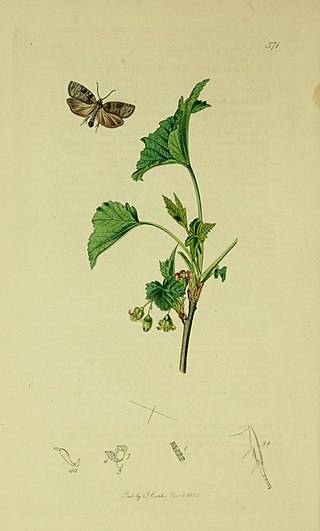
Apotomis semifasciana, the short-barred grey marble, is a moth of the family Tortricidae. It was first described by the English entomologist Adrian Hardy Haworth in 1811.
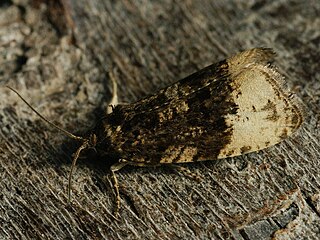
Hedya ochroleucana, the buff-tipped marble or long-cloaked marble, is a moth of the family Tortricidae. It is found in most of Europe, except part of the Balkan Peninsula and Ukraine and east across the Palearctic. It is also present in most of North America.

Aethes rubigana, the burdock conch, is a moth of the family Tortricidae. It was described by Treitschke in 1830. It is found in most of Europe, except the Iberian Peninsula and part of the Balkan Peninsula. Outside of Europe, it is found in China, Japan and Russia.

Cochylichroa atricapitana, the black-headed conch, is a moth of the family Tortricidae. It is found in China (Xinjiang) and the eastern Palearctic and most of Europe.
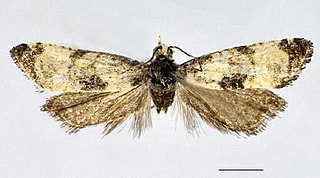
Cochylis dubitana, the little conch, is a moth of the family Tortricidae. It is found in China (Heilongjiang) and most of Europe. and the Caucasus. It is also found in North America, where it has been recorded from Colorado, Maine, Ontario and Washington.
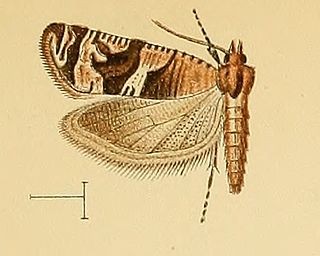
Lobesia neptunia is a moth of the family Tortricidae. It is found on the Canary Islands and Madeira.

Celypha rurestrana, the hawkweed marble, is a moth of the family Tortricidae. It was described by Philogène Auguste Joseph Duponchel in 1843. It is found in most of Europe, except Ireland, Lithuania, Ukraine and the western part of the Balkan Peninsula. It is also found in Turkey.
Archips alberta is a species of moth of the family Tortricidae first described by James Halliday McDunnough in 1923. It is found in North America, where it has been recorded across boreal Canada, south through the mountains to Utah. The habitat consists of coniferous forests.
Argyrotaenia occultana, the fall spruce needle moth, is a moth of the family Tortricidae. The species was first described by Thomas Nesbitt Freeman in 1942. It is found in North America, where it has been recorded from British Columbia north to Yukon and Northwest Territories, east to Newfoundland and south to Kentucky and Oregon. The habitat consists of spruce forests.
Planotortrix puffini is a species of moth of the family Tortricidae. It is endemic to New Zealand. Specimens have been collected from Lee Bay in Stewart Island.

Spatalistis bifasciana is a species of moth of the family Tortricidae. It is found in most of Europe.

















